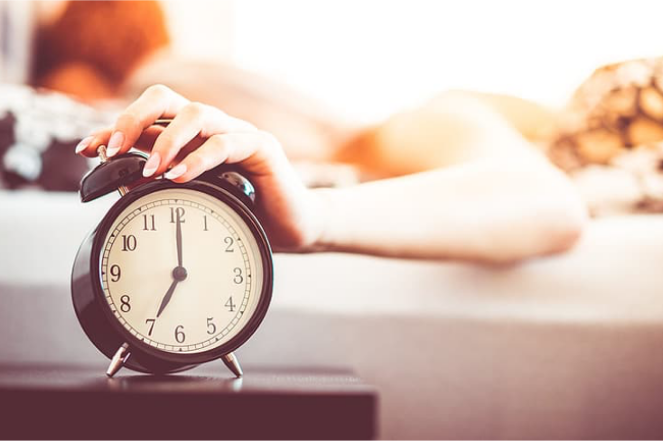Sleep can play such an important part in our physical and mental health.
Yet, since earlier this year, some of you may have found the quality of your sleep has taken a bigger hit than ever.
For many, your routines and work schedules have changed in some way over the course of 2020, and as a result, you’ve had to adapt.
But adapting isn’t always smooth sailing; It can be stressful. And what can happen when you’re stressed? That’s right – Poor sleep.

Adequate levels of sleep can allow us to be healthy, functioning humans. But without it, we can exhibit side effects such as memory and focus problems, a lower immune system, and rapid mood changes, to name a few.
The Sleep Health Foundation (SHF) says the feelings of anxiety and fear, which are normal emotions to experience in these times of uncertainty, can be linked to sleep issues.
The American Academy of Sleep Medicine (AASM) and the Sleep Research Society (SRS) recommend getting at least seven hours of sleep every night (and even more for some people), in order to feel well-rested.
However, even before COVID-19, a reported one-third of adults weren’t getting enough sleep in the U.S. alone.

And it’s not just about quantity. It’s also about the quality!
According to the SHF, poor quality sleep may result in the inability to properly function throughout the day.
So, if you struggle to fall asleep, have many late nights (or simply feel tired even though you got in your 7+ hours of snooze time), can you benefit from hitting the snooze button and sleeping in every once in a while?
Naturally, allowing yourself some extra rest time, even if it’s just every so often, is not a crime. But, while it can make you feel good temporarily, studies show it doesn’t necessarily provide benefits if you otherwise practice a poor sleeping schedule.

I know, this disappoints me too.
According to the National Sleep Foundation, sleeping in on the weekends won’t make up for all the times you had bad or little sleep:
“While it may help you feel slightly less drowsy and stressed out that day, it won’t eliminate the negative, cumulative effects that sleep loss has on your health.”
Further, a study presented at the American Heart Association’s Scientific Sessions in 2017 examined sleeping patterns for over 21, 000 older female health care professionals. Each of these women had no history of cardiovascular disease or cancer. Yet, the study revealed potential links to poor sleep and potential illness:
“Those who spent two or more hours catching up on sleep over the weekend — what researchers call “sleep debt” — were more likely to have poor cardiovascular health,” reported the American Heart Association.
But are there any benefits?
Well, a 2018 study by Akerstedt et al found a good sleep in can actually be linked to some health benefits, such as potentially counteracting obesity in children who sleep less during the week, and for adults, it may help in preventing hypertension.

So it’s not all bad news, fellow night owls.
Even so, while sleeping in may provide some benefits, your best bet may be to try to get in the hours of sleep where you can, in ways that encourage quality of sleep.
How can I do that you ask?
If sleeping in once in a while really isn’t for you, and you want to regulate your sleeping patterns, you can try these nine tips recently published by the SHF, summarised below:
- Limit media consumption: When it comes to all things COVID-19, checking official website such as health.gov.au, and staying clear of exaggerated or ambiguous media reports is recommended.
- Have some you time: Unwind by spending some time on things that relax you. The SHF says this could be done by “relaxing and watching, listening or reading about things that have nothing to do with COVID-19.”
- Take care of your body: Exercise, eat well, practise all things in moderation, and avoid alcohol or caffeine before bed.
- Connect with others: Even a quick chat with a friend could help you feel better!
- Take care of your mind: Have some quiet time, perhaps even put your concerns into writing so you can deal with them after a good sleep.
- Making your bed predominantly for sleeping: The SHF suggest it’s important to have a strong link between your bed and having good quality sleep. If you can’t sleep, they recommend leaving your bed, doing something that can relax you, then going back when you’re tired again (trying not to expose yourself to too much light in the process!).
- Regulate your sleep-wake routine: You could try adopting a strict sleeping routine; rising and waking at the same time each day and night.
- Manage fatigue: Know that when you do have rough sleep, you will be able to get through the day. Depending on how tired you are, your sleep may be better the following night.
- Remember the sleep will come eventually: You can’t always force it. The SHF says sleep is like a butterfly: If you calmly and patiently wait for it, being quiet and relaxed, the sleep will eventually come to you.
P.s. I will admit, I was writing this at midnight. So it’s probably time for me to take this info on board too. (After my sleep in, of course).
***
Author’s disclaimer: This article includes references to external research and other sources which have been referenced/linked accordingly. This article itself is not designed to be taken as a substitute for personalised professional medical advice. If you are feeling abnormally tired or unwell, you may benefit from contacting your health professional. If you are experiencing anxiety, fear, stress and want to talk to someone about it, you can contact Lifeline on 13 11 14, or text them here.
Feature image: Pikrepo

